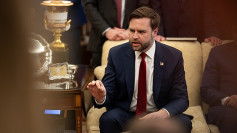The U.S. military said in a declaration of its overall strategy released on Thursday that China is the most significant challenge for the country, despite the "acute threats" Moscow poses being highlighted by its invasion of Ukraine.
The Pentagon also made it plain that the United States intended for its nuclear arsenal to resist "all forms of strategic attack," including those utilizing conventional weapons, amid Russian speculation of using a nuclear weapon in the Ukraine war.
The National Defense Strategy's unclassified version stated that China "presents the most consequential and systemic challenge, while Russia poses acute threats - both to vital U.S. national interests abroad and to the homeland."
"The most comprehensive and serious challenge to U.S. national security is (China's) coercive and increasingly aggressive endeavor to refashion the Indo-Pacific region and the international system to suit its interests and authoritarian preferences," it said.
U.S. Defense Secretary Lloyd Austin published unclassified versions of major military policy documents while highlighting the various difficulties posed by China and Russia. According to Austin, China "is the only competitor out there with both the intent to reshape the international order, and increasingly the power to do so."
The approach identifies Chinese rhetoric on Taiwan's self-rule, which Beijing has threatened to annex by force if necessary, as a potentially dangerous destabilizing factor that raises the possibility of error and jeopardizes regional peace. Regarding Russia, it claims that the most recent example of the threat Moscow poses is its unprovoked, further invasion of Ukraine.
In an updated report on U.S. nuclear posture released concurrently with the National Defense Strategy, the Pentagon defined the role of its nuclear arsenal as to deter both foreign nuclear and non-nuclear attacks that have strategic implications. It emphasized the need for cooperation with allied countries and other partners to counter the dangers posed by China and Russia, saying such cooperation is "foundational for U.S. national security interests."
It asserts that Beijing is attempting to refashion the Indo-Pacific region and the international order to match its interests and authoritarian values, calling this movement the most extensive and serious danger to US national security.
The Missile Defense Review, which was also made public on Thursday, also highlights the mounting dangers posed by China and Russia. Moscow is updating its intercontinental-range missile systems and creating new precision-strike missiles, while Beijing is catching up to Washington in terms of ballistic and hypersonic missile capability.
On Thursday, Russian President Vladimir Putin provided a strikingly different perspective on the global strategic environment, claiming that Moscow is attempting to "defend its right to exist" in the face of Western attempts to "destroy" his nation.






